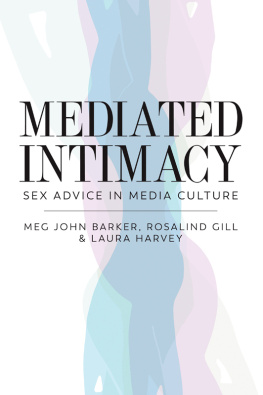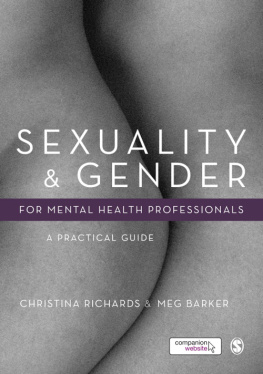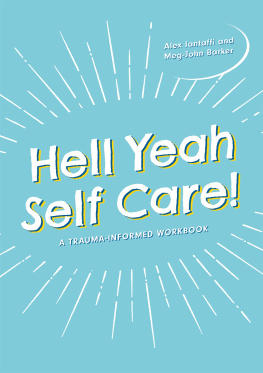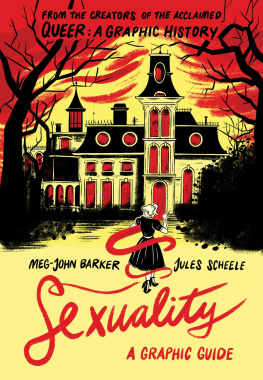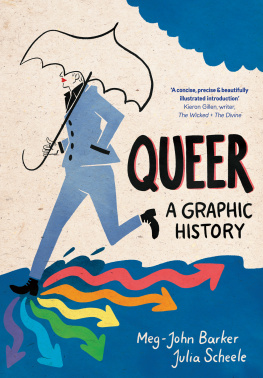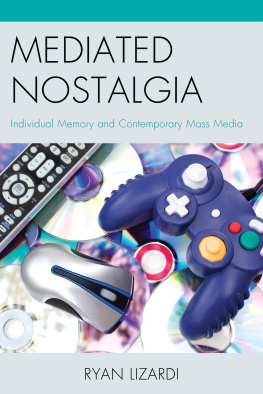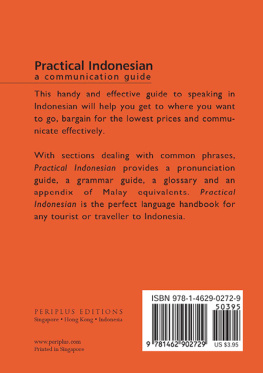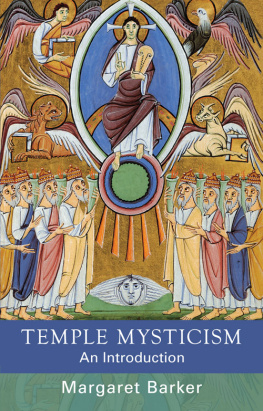Barker Meg-John - Mediated Intimacy: Sex Advice in Media Culture
Here you can read online Barker Meg-John - Mediated Intimacy: Sex Advice in Media Culture full text of the book (entire story) in english for free. Download pdf and epub, get meaning, cover and reviews about this ebook. year: 2018, genre: Home and family. Description of the work, (preface) as well as reviews are available. Best literature library LitArk.com created for fans of good reading and offers a wide selection of genres:
Romance novel
Science fiction
Adventure
Detective
Science
History
Home and family
Prose
Art
Politics
Computer
Non-fiction
Religion
Business
Children
Humor
Choose a favorite category and find really read worthwhile books. Enjoy immersion in the world of imagination, feel the emotions of the characters or learn something new for yourself, make an fascinating discovery.
- Book:Mediated Intimacy: Sex Advice in Media Culture
- Author:
- Genre:
- Year:2018
- Rating:3 / 5
- Favourites:Add to favourites
- Your mark:
- 60
- 1
- 2
- 3
- 4
- 5
Mediated Intimacy: Sex Advice in Media Culture: summary, description and annotation
We offer to read an annotation, description, summary or preface (depends on what the author of the book "Mediated Intimacy: Sex Advice in Media Culture" wrote himself). If you haven't found the necessary information about the book — write in the comments, we will try to find it.
Mediated Intimacy: Sex Advice in Media Culture — read online for free the complete book (whole text) full work
Below is the text of the book, divided by pages. System saving the place of the last page read, allows you to conveniently read the book "Mediated Intimacy: Sex Advice in Media Culture" online for free, without having to search again every time where you left off. Put a bookmark, and you can go to the page where you finished reading at any time.
Font size:
Interval:
Bookmark:


Copyright Meg-John Barker, Rosalind Gill and Laura Harvey 2018
The right of Meg-John Barker, Rosalind Gill and Laura Harvey to be identified as Authors of this Work has been asserted in accordance with the UK Copyright, Designs and Patents Act 1988.
First published in 2018 by Polity Press
Polity Press
65 Bridge Street
Cambridge CB2 1UR, UK
Polity Press
101 Station Landing
Suite 300
Medford, MA 02155, USA
All rights reserved. Except for the quotation of short passages for the purpose of criticism and review, no part of this publication may be reproduced, stored in a retrieval system or transmitted, in any form or by any means, electronic, mechanical, photocopying, recording or otherwise, without the prior permission of the publisher.
ISBN-13: 978-1-5095-0911-9 (hardback)
ISBN-13: 978-1-5095-0912-6 (paperback)
A catalogue record for this book is available from the British Library.
Typeset in 10.5 on 11.5 pt Sabon
by Toppan Best-set Premedia Limited
Printed and bound in Great Britain by Clays Ltd, St. Ives PLC
The publisher has used its best endeavours to ensure that the URLs for external websites referred to in this book are correct and active at the time of going to press. However, the publisher has no responsibility for the websites and can make no guarantee that a site will remain live or that the content is or will remain appropriate.
Every effort has been made to trace all copyright holders, but if any have been inadvertently overlooked the publisher will be pleased to include any necessary credits in any subsequent reprint or edition.
For further information on Polity, visit our website: politybooks.com
While writing this book, we've reflected a good deal on the topic of collective care in academic work. The project has been with us through some major personal and political struggles, which have become woven through the fabric of our work together.
We want to acknowledge and celebrate here the importance of kindness and collaborative support in research and writing. In the context of increasing pressure, audit and individualism in higher education, collective care and solidarity can challenge some of the assumptions of neoliberal managerialism and help to provide the breathing space to share and develop ideas together. We've found that it has been hugely helpful to continually reflect upon the process of our work together, as well as the content, and to build an ethic of self-care explicitly into our collaboration. For example, we've frequently discussed how the shifting cultural and political situation is echoed in the materials we've been drawing upon, and how we're personally and professionally impacted by this. Additionally we've allowed time for debriefing into all of our collaborative writing sessions and have tried to prioritize care over deadlines.
Partly for this reason, this book has been in process for longer than we originally anticipated. We would like to thank all at Polity very much for their patience and support for the project particularly Ellen MacDonald-Kramer, Mary Savigar and Susan Beer. We believe that the book is stronger for the time that we've spent developing our ideas and carrying out additional research, in particular around newer phenomena such as phone sex apps and sex advice zines. This has also enabled us to reflect in the conclusions on some of our own experiences of producing sex advice, which we hope you'll find valuable.
The ideas in the chapters that follow are shaped by the conversations we've had together and with many other colleagues and friends and we offer some thank yous below. First, however, we would like to express our enormous appreciation to Yvonne Ehrstein, who helped us at the final stages with preparing the manuscript, with amazing good grace, super-efficiency and unfailing good humour. Thank you Yvonne! It has been a pleasure working with you. And thank you also to the School of Arts and Social Sciences at City, University of London (especially to Kim Edmunds and Caroline Sipos), whose funding made this possible.
Meg-John would like to give a huge thank you to Justin Hancock for all his inspiration and support, and for being happy to work together on the megjohnandjustin.com project, which has been another dreamy collaboration. Many thanks also to Elli Frank for obtaining many of the online materials for the Communication and Consent chapter, and for useful discussions about these topics. Meg-John would also like to thank Petra Boynton, Lisa Downing, Feona Attwood, Clarissa Smith, Clare Bale, Emma Renold, and all the other people who were involved in the Critical Sexology, Sense About Sex, Sexualization Report, and Bad Sex Media Bingo projects, which were such important foundations for this project. And thanks, finally, to all the many activists who've helped them to think even more critically about sex over the years.
Ros would like to thank Jude Willetts, Bruna Seu, Shani Orgad, Roisin Ryan Flood, Veronica Forwood, Christina Scharff, Catherine Rottenberg, Andy Pratt, Rachel O'Neil, Sara de Benedictis, Laura Favaro, Sylvia Chant, Sarah Banet-Weiser, Beverley Dean, Chris Phipps and Ngaire Donaghue for personal and intellectual support. Thanks also to colleagues and PhD students at King's and City and beyond. In addition, Ros would like to thank Elektra Lapavitsas for research assistance. A special thanks to students on the gender and sexualities courses and to everyone involved in the Gender and Sexualities Research Forum. Ros would also like to thank the many people who shared work ahead of publication or responded to messages on the MECCSA list-server with queries like who is writing about The Undateables? and so on. There are too many people to thank individually, but Ros sends heartfelt appreciation, and with Meg-John and Laura a profound commitment to thinking about all our work as collective.
Laura would like to add her thanks for support, solidarity and collaboration to Ema Webb, Heather Mendick, Kim Allen, Jessica Ringrose, Hannah Frith, Kyla Ellis-Sloan, Tansy Hoskins, Kiran Dhami and the undergraduate students of Sex and Society at the University of Brighton.
Thanks, finally, to the reviewers for their extremely helpful comments on the book and to all the sex advisors whose work we have included. We do hope that you'll find our analyses of value.
Mediated Intimacy: Sex Advice in Media Culture
The bold argument of this book is that media of various kinds play an increasingly important role in shaping people's knowledge, desires, practices and expectations about intimate relationships. While arguments rage about the nature and content of sex and relationship education in schools, it is becoming clear that more and more of us young and old look not to formal education, or even to our friends, for information about sex, but to the media (Attwood et al., 2015; Albury, 2016). This is not simply a matter of media advice in the form of self-help books, magazine problem pages, or online agony columns though these are all proliferating and are discussed at length in this book. It is also about the wider cultural habitat of images, ideas and discourses about intimacy that circulate through and across media: the happy endings of romantic comedies; the money shots of pornography; the celebrity gossip about who is seeing whom, who is cheating, and who is looking hot; the lifestyle TV about embarrassing bodies or being undateable; the newspaper features on how to have a good divorce or ten things never to say on a first date; or the new smartphone apps that incite us to quantify and rate our sex lives, etc. These constitute the taken for granted of everyday understandings of intimacy, and they are at the heart of this book.
Next pageFont size:
Interval:
Bookmark:
Similar books «Mediated Intimacy: Sex Advice in Media Culture»
Look at similar books to Mediated Intimacy: Sex Advice in Media Culture. We have selected literature similar in name and meaning in the hope of providing readers with more options to find new, interesting, not yet read works.
Discussion, reviews of the book Mediated Intimacy: Sex Advice in Media Culture and just readers' own opinions. Leave your comments, write what you think about the work, its meaning or the main characters. Specify what exactly you liked and what you didn't like, and why you think so.

